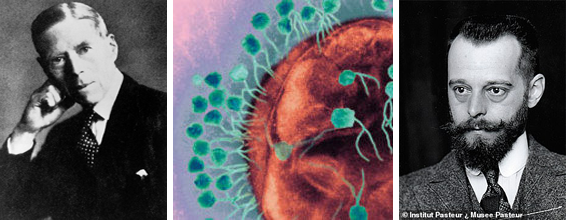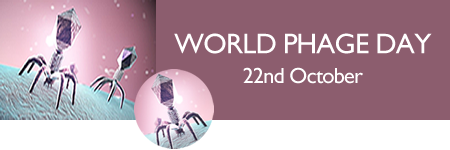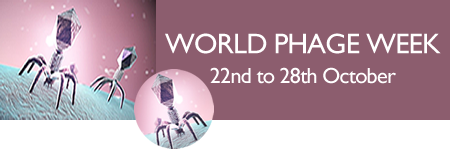World Phage Day was created to provide an opportunity to promote the long-overlooked phage - the most diverse organism on the planet. The special day recalls the important pioneering work of both Frederick Twort and Felix d’Herelle and to celebrate the collaborative work of everyone, past and present, pioneering the development of phage and phage therapy.
The 22nd October also marks the 1877 birth date of Frederick Twort, a British microbiologist, the father of virology, who in 1915, published his pioneering work, ‘An Investigation on the Nature of Ultra-Microscopic Viruses’ in the Lancet. It was the first report of viruses injecting their own DNA or RNA into a susceptible bacteria, which uses its cellular machinery to replicate the genetic material of the phage, producing multiple phages which are then are explosively released, killing the host bacteria.
Unfortunately, he was unable to continue with his ground-breaking work as his research funding was suspended by the outbreak of the First World War. He was sent to serve abroad as an army medical officer.
The second scientist credited with the discovery of the bacteriophage, Felix d’Herelle, a French-Candian, was based at the Pasteur Institute, where he was able to continue his research. He named the bacteria-eating virus ‘bacteriophage’ - now usually referred to as ‘phage’. The term bacteriophage is derived from "bacteria" and the Greek: (phagein), "to devour". Gathering evidence for successful application of bacteriophages, he published his work in 1917. He perfected a technique for isolating bacteriophages and published Le bácteriophage, son rôle dans l’immunité (1921; “The Bacteriophage, Its Role in Immunity”). Although he achieved some success in using bacteriophages in the treatment of dysentery and other infections, the medical use of these agents against such diseases was later replaced by antibiotic and other drug therapy.
The combined ground-breaking work of both phage pioneers was recognised as the ‘Twort-d’Herelle phenomenon’.
For a brief history of Bacteriophages visit http://www.intralytix.com/index.php?page=hist
The Phage Pioneers - Twort-d’Herelle Phenomenon

(Frederick Twort and Felix d'Herelle)
Promoting Phage Development
World Phage Week is an opportunity to recall the important pioneering work of both Frederick Twort and Felix d’Herelle and to celebrate the collaborative work of everyone, past and present, pioneering the development of phage therapy. To combat the threat to global health posed by the ever-increasing antimicrobial, fungal and antimalarial resistance requires a global coordinated response, new antibiotics and alternative therapeutics. The long overlooked potential offered by bacteriophage development is now being recognised and researched as one lifesaving option. World Phage Week provides an additional focus on the European Antibiotic Awareness Day, 18 November and World Antibiotic Awareness Week, 18-24 November.
Phage researchers and ‘phage phans’ around the world are encouraged to join with AGEofthePHAGE.com and promote awareness of the wide-ranging and life-saving potential offered by phage development.
Please promote #WorldPhageDay (22nd October) and #WorldPhageWeek (22nd to 28th October)
Do tweet our banners and create your own phage images for social media and organise special events.
Please send details of any phage-related promotional actions you organise, or participate in, to contact [at] AGEofthePHAGE.com



